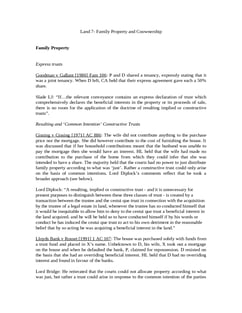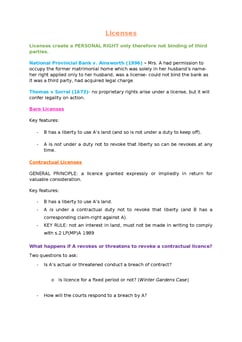Williams and Glyn's Bank v Boland [1981] AC 487
Judgement for the case Williams and Glyn's Bank v Boland
KEY POINTS
In the issue about "actual occupation" of the matrimonial home, with complexities arising from the wife's significant financial contribution, the husband's sole ownership, and a bank's claim due to the property's encumbrance. The wife asserts her rightful interest in the property based on her substantial investment.
The Land Registration Act of 1925, specifically sections 3 (xv), 3 (xvi), 20 (1), 70 (1) (g), and 74, forms the core legal framework for this case. These sections will guide the court in resolving the complex array of claims, considering contributions, property ownership, and encumbrances. A thorough examination of these provisions will determine a just resolution while acknowledging the wife's significant stake in the matrimonial home.
FACTS
In two cases involving land possession disputes, the husband was the registered owner of their matrimonial home. Despite the wife's significant financial contributions to the property, she hadn't registered any legal interest.
Unbeknownst to the wife, the husband used the home as collateral for business debts, and the bank, holding these charges, didn't inquire about the wife's stake. With the debts unpaid, the bank sought possession of the homes.
In the first appeal, the husband's claims were dismissed, and the bank was granted possession by Templeman J. He ruled that the wife's interest wasn't significant and didn't meet the "actual occupation" criteria under the Land Registration Act 1925.
The second appeal upheld Templeman J.'s decision, resulting in possession orders against the spouses. Both cases were subsequently appealed, one by both the husband and wife and the other by the wife alone.
JUDGEMENT
The appeals are allowed.
The wives' contributions to the purchase of the marital homes established them as equitable tenants in common of the properties under trusts for sale, with the legal estates held solely by their husbands as trustees. While these interests were considered "minor" under the Land Registration Act 1925, they qualified as "overriding interests" under sections 20 (1) (b) and 70 (1) of the Act, affecting the estate created by the charges.
The wives were deemed to be in "actual occupation of the land" according to section 70 (1) (g) of the 1925 Act. Consequently, they held overriding interests that took precedence over the bank's charges and were entitled to protection in their occupation of the matrimonial homes.
The bank's claim against the husband in the first appeal should be examined under the provisions of section 36 of the Administration of Justice Act 1970.
In a unanimous decision, it is emphasized that lenders providing funds secured by matrimonial homes must recognize that most wives now possess proprietary interests, and they should conduct the necessary inquiries accordingly.
COMMENTARY
The case discusses the concept of "actual occupation" as a crucial legal principle, particularly in marital homes. Key factors include the wife's financial contributions, the husband's sole property registration, and a bank's claim for possession, highlighting the complexity of property rights.
The court's judgment represents a significant shift in favor of the wives' rights. They are recognized as equitable tenants in common due to their financial contributions, granting them overriding interests under the Land Registration Act 1925. The court's interpretation of "actual occupation" reinforces its importance and strengthens the wives' claims.
The judgment emphasizes the need for lenders to conduct thorough due diligence when securing loans against matrimonial homes. It also acknowledges the evolving nature of property rights, especially when spouses contribute significantly to property purchases. In doing so, the court reinforces equitable treatment and spousal interest protection.
ORIGINAL ANALYSIS
The house was registered in the name of Mr. Boland alone, making him its sole legal owner. But Mrs. Boland had acquired a beneficial interest in it – i.e. Mr. Boland held it on trust for himself and. Mr. Boland, however, had mortgaged the house to Williams & Glyn’s Bank.
When Mr. Boland couldn’t pay off the loan, and the bank wanted to repossess, the question was whether Mrs. Boland could object that her interest prevented them from doing so.
-
HL held that she could. HL held that Mrs. Boland had an overriding interest because:
She was in actual occupation and
A minor, registrable, unregistered interest COULD be an overriding interest.
NB, S.70(1)(g) relates to an interest by someone in actual occupation being overriding, except where reasonable inquiries have been made etc.
Lord Wilberforce
“actual occupation”= physical occupation.
He rejects the arguments that there can be only one occupier (factually incorrect), that husbands and wives cannot have separate occupations (Wilberforce calls this “obsolete” i.e. anachronistic) and finally that where the wife’s occupation depends on her husband’s title, she cannot be in actual occupation (this would be to disregard all rights of people cohabiting where the house is in one person’s name).
He rejects the argument that, because under s.74 notices of trust are excluded from the register, the types of interest recognised by the 1925 LRA (legal estate, minor/equitable interest and overriding interest) are mutually exclusive. He says the point of that section is purely an administrative one: that the doctrine of notice has no effect on registered conveyancing. Its effect is not to prevent s.70(1)(g) from applying to equitable/minor interests. The interest here could be both minor AND overriding.
Lord Scarman
S.70(1)(g) is intended to “meet the needs of social justice” and this is clearly its effect. Therefore it must apply in cases like this.
Bankers and conveyancers must adapt to fit the needs of social justice, not vice versa. The wife was in actual occupation (literal meaning), had an interest, and this interest could have been discovered by the bank, but it made no enquiry.
RELATED CASES
For Further Study on Williams and Glyn's Bank v Boland
Need instant answers? Our AI exam tutor is here to help.
Ask questions 🙋 Get answers 📔 It's simple 👁️👄👁️
Our AI is educated by the highest scoring students across all subjects and schools. Join hundreds of your peers today.
Get StartedSimilar Cases
Related Product Samples
These product samples contain the same concepts we cover in this case.
| Land Law | Registration Theory Notes (39 pages) |
| Property Law | Registration And Acquisition Of Legal Estates Notes (15 pages) |
| Land Law | Trusts Of Land Notes (11 pages) |


